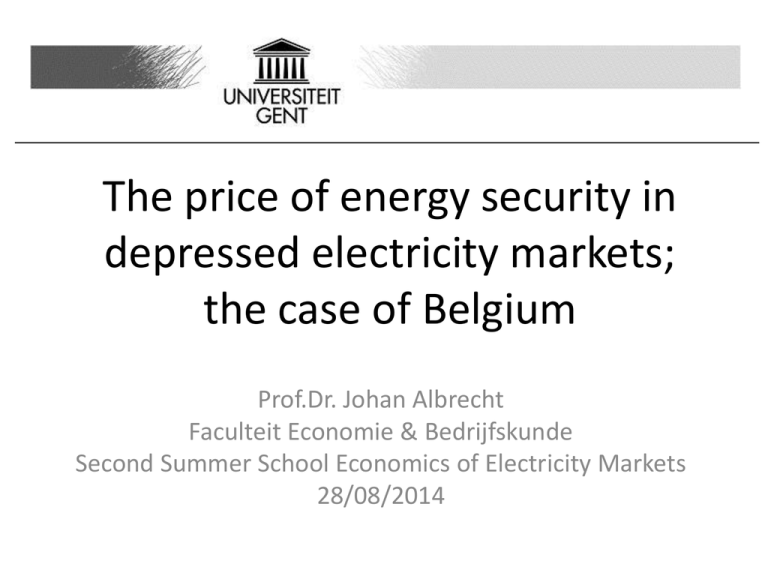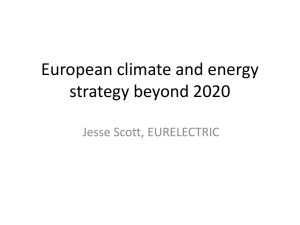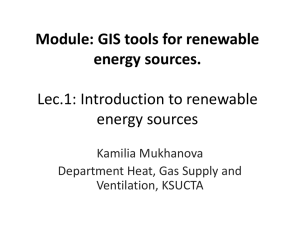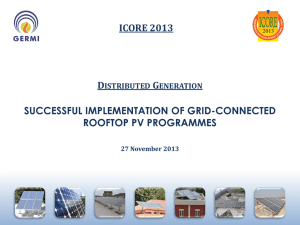here
advertisement

The price of energy security in depressed electricity markets; the case of Belgium Prof.Dr. Johan Albrecht Faculteit Economie & Bedrijfskunde Second Summer School Economics of Electricity Markets 28/08/2014 Structure • The Belgian context • ‘Security of supply’ has two dimensions: follow peak demand & avoid excessive overproduction (intermittent RES) • ‘No Policy’ scenario; not sustainable • ‘Security of supply’ scenarios ; new assets, old thermal assets, DSM & combinations • Surplus risk assessment • Conclusions The Belgian Context • Firm capacity of 15 700 MW (13 000 MW today) • Nuclear phase-out: 5 900 MW Changing Load Factors (LF) RES <-> Gas Wholesale prices in CWE Peak Load; decreasing? Plan Wathelet • Extension Tihange 1, 800 MW CCGT, 400 MW DSM Reserve Margin (RM) 2012/2013 RM in ‘No Policy’ scenario Supply scenarios for Belgium • Policy options; incentives for flexible generation (new and old termal), DSM, CFD for RES (with/without Market Participation (MP)) • Investment and system cost of policy options? (with 8% discount rate, LCOE-approach) • Assumptions on context; peak demand + 0,5%/yr, carbon price up to € 40 per ton CO2 in 2030, endogenous price model (more RES -> lower wholesale prices), network costs increase with RES share LCOE assumptions Endogenous price model Prices in NEA for DE Network costs as f(RES) Security of supply; RM > 5% at all times • IF (‘No Policy’ RM < 5%) THEN model triggers CCGT, OCGT & Biomass investments • Context: old thermal, DSM, BAU RES and High RES New capacity; split up Incentive schemes • Capacity payments for CCGT (€ 900/kW), OCGT (€ 700/kW) and Biomass (€ 1050/kW) • RES support per MWh (incl. Biomass) ; CFD = LCOE minus price • CFD-MP includes curtailment (max 5% PV, max 14% wind) • CFD-MP; lower LF, higher LCOE, higher CFD Old Thermal & DSM • end of 1 300 MW OT scheduled for 2014-2024; in reserve capacity, 5% LF @ € 95/MWh (€ 50 to 60 mill) • DSM clearing prices of € 150/MW/day (based on UBS) Firm capacity in 2030; 18 GW / RM 9% Peak demand of 14,7 GW in 2030 Gas dominates / old thermal; end of life in 2024 Biomass; 3 000 – 3 500 MW in BAU RES / 4 000 – 4 500 MW in High RES Total capacity in 2030; 25 – 30 GW Electricity production in 2030 CFD-MP; Biomass used in flexible way -> higher LF for CCGT Share of RES in 2030: from 28% in BAU RES CFD-MP to 60% in High RES CFD Generation portfolio LF WP Bureau Fédéral du Plan, 2013 Annual subsidy cost: cap pay + CFD • All results: additional to subsidy cost of 2014 • One-off capacity payments in year of investment Cumulative cost up to 2030; € 21 and € 41 bill -> MP of RES matters! Optimal frameworks and RES share? • Trade-off between RES share and costs is not linear LCOE generation mix, 2012-2030 Total annual system costs (gen+netw) Total costs and RES share Cumulative System Costs 2014-2030 Cumulative System Costs & RES-share (2030) Cumulative Subsidy Costs & Cumulative System Costs (2014-2030) Surplus risks? • Only with ‘New Capacity’ scenarios • Random PV & wind generation in Matlab (10 000 patterns), based on Elia • ‘Must-run’; biomass (MP), CHP & nuclear • Compared to demand variation in 15 min intervals • Demand (15 min) <-> (RES + Must Run) • Export capacity of 3 500 MW; surplus of 3 000 is problematic • DSM (to increase demand); here not included Illustration of PV+wind output for 29 days 2014 Surplus Risk 2017 Surplus Risk 2023 Surplus Risk 2027 Surplus Risk Overview Surplus Analysis Nuclear prolongation; 3 GW NUC in 2030 Conclusions 1 Conclusions 2 • To secure 5% RM, cumulative subsidy costs up to 2030 vary between € 21 and € 41 billion • Smart policy choices will lower costs for society, even at relatively high RES shares • Market participation by RES is essential to facilitate further expansion of RES • DSM lowers costs / Old thermal; limited relevance • limitations of this analysis; capacity payments as institutional challenge (end of EOM?), recovery of demand, delocalisation energy-intensive industries, evolution of interconnection, arrival of smart grid, share of electric vehicles by 2030, EC climate policies,… Thank you for your attention • Johan.albrecht@ugent.be • Second Summer School ‘Economics of Electricity Markets’ @ Ghent University, August 25-29, 2014 • http://www.ceem.ugent.be/SummerSchools/2014/in dex.htm









